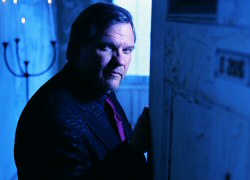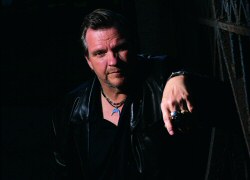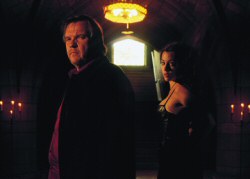
A chat with Meat Loaf
10/27/2006
Music Home / Entertainment Channel / Bullz-Eye Home
The man referred to as Mr. Loaf by The New York Times has a new album coming out, and…hey, were you just about to sneer, “What is it, Bat Out of Hell III?” If so, good call. Yes, that’s right, Meat Loaf has returned with the final chapter of the Bat saga (subtitled The Monster Is Loose), and he took a few minutes to chat with Bullz-Eye about it. Sure, it shows that he’s already spoken with about 350 different journalists about the record – as you’ll soon see, he steamrolled through a monologue about the various folks responsible for BOOH3, thereby pre-empting many of the questions we’d been planning to ask him about it – but, fortunately, we managed to get a few words in edgewise and quiz him on a few other topics, like “Fight Club,” Tenacious D, his appearance on “American Idol,” and the potential banning of “Paradise by the Dashboard Light” from karaoke bars everywhere.
Meat Loaf: Will…?
Bullz-Eye: Hello, Meat Loaf…?
ML: How are ya?
BE: Pretty good. How’re you doing?
ML: Okay.
BE: Where are you today?
ML: In New York. Where are you?
BE: I’m in Chesapeake, Virginia. Right next door to Norfolk and Virginia Beach.
ML: (seemingly bemused) Chesapeake, Virginia! At least you don’t have the U.N. in session.
BE: Not even remotely.
ML: I’m telling ya, they’ve got the streets blocked. I came out of the hotel yesterday, and the street was blocked off for three blocks. It’s like a nightmare…and so the guy from Venezuela can rant and rave!
BE: Well, the first question is probably the simplest, even if it’s probably the one you’re getting all the time: why Bat Out of Hell III?
ML: (Snappily) Whaddaya mean why? Because it was always meant to be a trilogy.
BE: Fair enough.
ML: And why now? You never determine now. You can decide what you want to eat for dinner, you can decide to go away for the weekend, and you can decide what clothes you’re going to wear in the morning, but when it comes to artistic things, there’s never a rhyme or reason. It’s, like, they just happen. And they happen when they happen. It’s like asking Monet, “When did you decide to paint the lilies?” “I didn’t; the lilies did.” Y’know? It’s kind of…Van Gogh.
BE: And lest anyone is concerned, I know there were rumors to the contrary for a while, but Jim Steinman is on the album? Well, his songs, at least.
ML: Yeah, he’s got songs on this record. Yes, he does. Jimmy didn’t produce it, and it was a hard decision to make, but he had had a second stroke, and I…I didn’t think he was physically ready to do it, to commit to that kind of work. And I was afraid we’d be in and out of the studio for five years…and I’m not exactly the youngest chicken in the pen, either! And, so, I needed to move!
BE: And I know that, this time around, he hasn’t written all of the songs, because you’ve got, like, Nikki Sixx…
ML: Boy, I’m having a hard time hearing you!
BE: I’m sorry. I was just saying that I know that, this time around, he hasn’t written all of the songs. You’ve got Nikki Sixx…
ML: No, but I’m gonna be perfectly honest with you. I’ll tell you something that’s happening. I have done, what, how many interviews in my life? Starting with Bat Out of Hell, going to Dead Ringer…but from almost 90…almost 100 percent…and I have done probably, I’m estimating, 350 interviews for this record already…that it has been received by the journalists that I’m talking to…I don’t know if any of these are critics, but by the journalists that I’ve talked to, it has been received better than any record I’ve done.
BE: Wow.
ML: And, y’know, if you hear one that says something, then you can go, “Okay, well, that one can fool me.” But you hear it in voices, and you hear it how they’re…the questions they’re asking, and you hear how it’s perceived and what they’re saying, and…it’s been a very interesting exercise on this record.
BE: Was it weird working with new guys on a concept that you and Steinman were so intimately connected with?
ML: No, because Desmond Child…it’s, like…you gotta understand that people attach me and Jim Steinman. But you really have to attach Todd Rundgren to that. (Writer’s note: Rundgren produced the original Bat Out of Hell album.) You cannot sit around and go, “Oh, Jim Steinman or Meat Loaf,” or “Jim Steinman and Meat Loaf.” You really have to attach Todd Rundgren.
BE: And I was gonna ask, because I know he does have a credit for “Additional Vocal Arrangements” (on the new album).
 ML: Yeah, but you really have to credit Todd Rundgren for the initial mark. Yes, Steinman had things in his head. And, yes, I had some things in my head; I had how “All Revved Up with No Place to Go” should sound in my head. Jim had how “You Took the Words Right Out of My Mouth (Hot Summer Night)” should sound in his head. But pulling things out of your head and accomplishing them, and somebody else trying to accomplish them, is a remarkable feat. Because I would say that nine times out of ten, people are always going, “Oh, that didn’t work the way I thought it was gonna work.” Y’know? I’m just saying, that’s human nature. But for Todd Rundgren to come in and do what he did…and everything that he did wasn’t right. Then you’ve gotta add a guy named John Jansen, who came in and repaired “Paradise by the Dashboard Light.” And then you’ve gotta come in and bring a guy named Jimmy Iovine into the picture, who fixed “Two Out of Three Ain’t Bad” and “All Revved Up.” And when you do that, you have Jim Steinman, Todd Rundgren, Meat Loaf, Jimmy Iovine, and John Jansen. And then you have those people that put a lot of creativity into…I mean, Jimmy Iovine totally made “Two Out of Three Ain’t Bad” a hit. I’m gonna give credit where credit is due. And I’m not taking anything away from Jim Steinman. I’m just saying, you can’t say, “Oh, this Meat Loaf and Jim Steinman thing, you cannot do it.” And then, on (Bat Out of Hell) II, again…and, also, you’ve gotta bring into the pen there, you gotta bring in Roy Bittan, who did a ton of work on arrangements on Bat Out of Hell, and did a ton of arrangements and chord structuring and things, like that on Bat Out of Hell II. So not taking anything away from Jim, ‘cause Jim is an absolute genius and one of the smartest people that I’ve ever known, and I consider him one of my best friends. But, y’know, sometimes, people just…they pigeonhole things, and they go, “Jim Steinman and Meat Loaf.” And my thing is, no, stop it! Because the Bat Out of Hell records are this: it’s a big wheel, and everybody is a spoke in that wheel…and, at different times as that wheel’s turning, different people have more input than others. It’s, like, as a wheel turns, the bottom spokes take more than the top spokes…but, pretty soon, those are gonna be the bottom spokes, and their import is more. And, so, that’s how that goes with the Bat Out of Hell records…and that’s exactly Bat Out of Hell III. We had so much creative input on this. Desmond Child was the director. Desmond Child is a slave driver…much more than Jim Steinman is a slave driver…and Desmond Child led by example on this record. And then you bring into this record not only Desmond Child and the creativity that a Brian May (of Queen) brings into it…and Brian May’s sitting in the room thinking that he’s in there for two hours, and he’s in there for ten going, “This ain’t good enough! This isn’t good enough! The sustain isn’t right! Get me another amp! This is wrong, this is wrong!” He could’ve come in and gone, “Yeah, that’s good. Okay, let’s go on. Nice seeing you.” But he didn’t do it. Steve Vai didn’t do that.
ML: Yeah, but you really have to credit Todd Rundgren for the initial mark. Yes, Steinman had things in his head. And, yes, I had some things in my head; I had how “All Revved Up with No Place to Go” should sound in my head. Jim had how “You Took the Words Right Out of My Mouth (Hot Summer Night)” should sound in his head. But pulling things out of your head and accomplishing them, and somebody else trying to accomplish them, is a remarkable feat. Because I would say that nine times out of ten, people are always going, “Oh, that didn’t work the way I thought it was gonna work.” Y’know? I’m just saying, that’s human nature. But for Todd Rundgren to come in and do what he did…and everything that he did wasn’t right. Then you’ve gotta add a guy named John Jansen, who came in and repaired “Paradise by the Dashboard Light.” And then you’ve gotta come in and bring a guy named Jimmy Iovine into the picture, who fixed “Two Out of Three Ain’t Bad” and “All Revved Up.” And when you do that, you have Jim Steinman, Todd Rundgren, Meat Loaf, Jimmy Iovine, and John Jansen. And then you have those people that put a lot of creativity into…I mean, Jimmy Iovine totally made “Two Out of Three Ain’t Bad” a hit. I’m gonna give credit where credit is due. And I’m not taking anything away from Jim Steinman. I’m just saying, you can’t say, “Oh, this Meat Loaf and Jim Steinman thing, you cannot do it.” And then, on (Bat Out of Hell) II, again…and, also, you’ve gotta bring into the pen there, you gotta bring in Roy Bittan, who did a ton of work on arrangements on Bat Out of Hell, and did a ton of arrangements and chord structuring and things, like that on Bat Out of Hell II. So not taking anything away from Jim, ‘cause Jim is an absolute genius and one of the smartest people that I’ve ever known, and I consider him one of my best friends. But, y’know, sometimes, people just…they pigeonhole things, and they go, “Jim Steinman and Meat Loaf.” And my thing is, no, stop it! Because the Bat Out of Hell records are this: it’s a big wheel, and everybody is a spoke in that wheel…and, at different times as that wheel’s turning, different people have more input than others. It’s, like, as a wheel turns, the bottom spokes take more than the top spokes…but, pretty soon, those are gonna be the bottom spokes, and their import is more. And, so, that’s how that goes with the Bat Out of Hell records…and that’s exactly Bat Out of Hell III. We had so much creative input on this. Desmond Child was the director. Desmond Child is a slave driver…much more than Jim Steinman is a slave driver…and Desmond Child led by example on this record. And then you bring into this record not only Desmond Child and the creativity that a Brian May (of Queen) brings into it…and Brian May’s sitting in the room thinking that he’s in there for two hours, and he’s in there for ten going, “This ain’t good enough! This isn’t good enough! The sustain isn’t right! Get me another amp! This is wrong, this is wrong!” He could’ve come in and gone, “Yeah, that’s good. Okay, let’s go on. Nice seeing you.” But he didn’t do it. Steve Vai didn’t do that.
BE: Did you…
ML: (Continues, unabated) John Shanks didn’t do that. Nobody did that. Everybody came in, heard what was going on, and went, “Oh, my God! Whoa! This is intense! Okay, we’re gonna go to the party here!” And then you get Greg Collins, who mixed this record, who said he’s never worked so hard in his life…and he won a Grammy for U2 last year!
BE: (Waits a moment to confirm that he’s done, then tries question again) Did you know Steve Vai and Brian May before this?
ML: Yeah. I’ve known Brian since the ‘80s.
BE: How did you come upon Marion Raven to sing with you on the song, “It’s All Coming Back to Me Now”? I know her profile is higher internationally than it is here in the States, but…
ML: Oh, her profile is very high internationally…in Asia and Scandanavia, and some in Australia. (Laughs) I don’t know if she has any profile in the States! But we found her…I mean, we were aware of her profile, and it was…first, it’s artistic: can she do it? Is she capable of handling this? Can she handle it emotionally? The song. Because it’s a very emotional song. Can she handle it melodically? Does she have the range for it? Second, now then, you’ve got that, now you look to see…because it’s a very strange duet, and I’ve always said it was meant to be a duet. I had the song in ’86, and I don’t care what anybody else says; I know it was my song, it was given to me in ’86, I was gonna do it, it was always gonna be a duet, and I think the only real life of it is a duet. And that’s my opinion, and my opinion only. That’s it. (Writer’s note: This brief but emphatic rant is almost certainly inspired by he fact that the song was recorded in 1996 by, ugh, Celine Dion.) But when it’s a duet, it’s a definitive duet. And then because of how it’s a call-and-response duet, you needed the timbre of the voices. If you get someone with the same timbres…I’m being analytical, but that’s exactly why we picked Marion Raven. And then on the fourth hand…what, she’s twenty-two years old? She can get MTV where I can’t!
BE: And, actually, speaking of that…
ML: What?
BE: Speaking of that demographic, how did it feel to perform the song on “American Idol”?
ML: Oh, I hated that.
BE: Did you really?
"I hated (being on 'American Idol.') That was a big mess. Oh, they didn't turn the music on for me; they were, at best, inept."ML: Yeah. I hated that. That was a big mess. Oh, they didn’t turn the music on for me; they were, at best, inept. For the first four lines, I had no music…and I only had a little sound. And every time I tried to sing, I tried to get softer so I could hear the music, and it didn’t work. And I got really nervous. Once the music came in, it was okay, y’know, but it was a duet, and it was meant to be played to each other, and at one point – because I’m sure (Katharine McPhee’s) mother told her to – played to the camera and kind of left me out. So, okay, fine, it’s her show, so I just let it slide. I didn’t try to bully my way into the china shop. I just went, okay, hey, it’s her deal, she’s been doing this for ten weeks, let her run…whereas Mary J. Blige basically just said “fuck you” to it and basically got rid of her duet partner and took over. And, y’know, I could’ve done that…and I’m not saying Mary J. Blige was wrong for doing it! I’m just saying those were two options. And, so, y’know, Katharine was a very sweet girl and she’s got a good voice; she just doesn’t know how to do a duet...or, at least, she didn’t know how to do that duet.
BE: And I hear you’re playing Jack Black’s father in the Tenacious D movie (“The Pick of Destiny”).
ML: Yeah, that’s very nice, yeah.
BE: That sounds like dream casting to me.
ML: Well, I wanted Jack Black to play me in the movie about me, and he was going to, and then it got postponed, and then his career took off. And when his career took off, he…I mean, honestly, he tried to make his schedule work, and I knew it wasn’t going to, because if I’m Jack Black, I’m not making this work. I’ve got these films and this film…I’m doing these films. I’m not stupid. But I appreciated the thought that went behind it to see if there was anything he could do to make it work. But from that point on, he’s been saying he wants me to play his father. He’s had this Tenacious D movie (in his head) for, I don’t know, ten years…and for the last five or six years, in all these articles when he talks about the movie, he always mentions, “I want Meat Loaf to play my father.” And I said, well, that’s fine, tell him that whenever he calls me and says, “I want you to play my father,” I will. And he did! He got my phone number, called me up on the phone, and said, “Meat, will you play my father?” And I said, “Yeah! It’s about time you called!” (Laughs)
BE: Have you made any headway on your dream of getting a guest spot on “Doctor Who”?
ML: That’s a made-up story, and I’m not the one who made it up!
BE: Is it really?
 ML: These stories get made up, and I don’t know from where. I have no idea. I didn’t make that one up – sometimes I make my own stories up – but I didn’t make that one up.
ML: These stories get made up, and I don’t know from where. I have no idea. I didn’t make that one up – sometimes I make my own stories up – but I didn’t make that one up.
BE: We just put together a list of the best use of music in movies…
ML: Yeah?
BE: …and “Fight Club,” with the Pixies’ “Where Is My Mind,” made the cut. Are you still haunted by the phrase “bitch tits”?
ML: Yeah, but that’s okay. That’s David Fincher’s thing, and I love David Fincher, so anything that David Fincher says is okay by me.
Publicist: Okay, we’ve got time for just one more question.
BE: Fair enough. I know you’ve appeared on “Celebrity Blackjack” and “Celebrity Poker Showdown.” Given that you enjoy playing poker that much, is the next stop a regular gig in Vegas?
ML: Not a prayer. Not even close to it. I gamble with other people’s money, but not my own.
BE: And just a short closing question: isn’t it about time they put out a public plea for karaoke bars…
ML: (Interrupts) Karaoke bars are devil worship!
BE: Okay, well, that’s good, because I was going to say that it’s time they banned anyone from ever singing “Paradise by the Dashboard Light,” because, invariably, anyone who thinks they can sing it, can’t.
ML: Well, the song they really should bar people from is “Desperado,” by the Eagles. Or “Like a Virgin,” by Madonna. Those are the two that should be barred.
BE: Okay. Well, I appreciate talking to you, Meat Loaf.
ML: Great, thanks!








